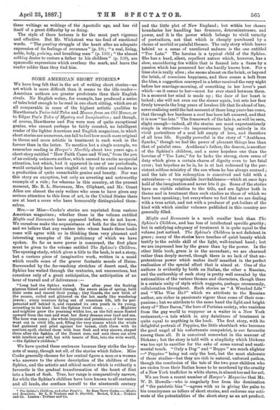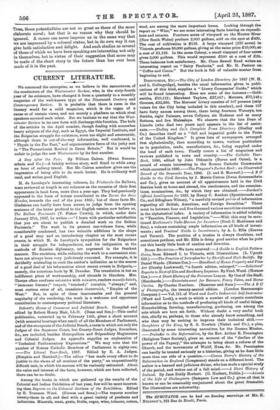SOME AMERICAN SHORT STORIES" WE have long felt that in
the art of writing short stories—an art which is more difficult than it seems to the idle reader— American authors are greater proficients than their English rivals. No English writer, for example, has produced a series of tales brief enough to be read in one short sitting, which are at all comparable in some of the highest artistic qualities to Hawthorne's Twice-told Tales and Mosses from an Old Manse, or to Edgar Poe's Tales of Mystery and Imagination ; and though, of course, Hawthorne and Poe were men of quite exceptional genius, who cannot perhaps be fairly counted, no intelligent reader of the lighter American and English magazines, in which short stories are numerous, can fail to feel how much more original in theme and more artistic in treatment is such work in the former than in the latter. To mention but a single example, we remember reading in Harper's Monthly about two years ago, a short story entitled "How Faith Came and Went," from the pen of an entirely unknown author, which seemed to excite no special attention, but which, had it appeared in one of our periodicals, would certainly have been singled out by critics and readers as a production of quite remarkable genius and beauty. Nor was this story an exception, but only an arresting and noteworthy example of a rule ; for whereas in this country, at the present moment, Mr. R. L. Stevenson, Mrs. Oliphant, and Mr. Grant Allen are almost the only writers who seem to have given any serious attention to this form of art, in the United States there are at least a score who have honourably distinguished them- selves.
Mrs.—or Miss—Cooke's stories are reprinted from various American magazines ; whether those in the volume entitled Misfits and Remnants have appeared before, we do not know. We ourselves make the acquaintance of both for the first time, and we believe that any readers into whose hands these books come will agree with us in thinking them very pleasant and interesting examples of the proficiency of which we have spoken. So far as mere power is concerned, the first place must be given to the volume entitled The Sphinx's Children. The opening study, which gives a title to the book, is not a story, but a curious piece of imaginative work, written in a mood which recalls some of the graver fantastic moods of Heine. Surrounded by the far-reaching stretches of desert sand, the Sphinx has waited through the centuries, not unconscious, but conscious only of a great anticipation, the anticipation of an hour of travail and of deliverance
"Long had the Sphinx waited. Year after year the docking pigeons flitted and wheeled through the sweet skies of spring, built their nests and reared their young ; tiny lizards, the new birth of the season, coiled and glittered on the hot sands like wandering jewels; every creature dying out of conscious life, left its per- petuated self behind it, and repeated its own youth in its young,
according to its kind but the Sphinx lived alone Mightier and mightier grew the yearning within her, as the fall moon floated upward from the east and west her dewy dreams over land and sea. The hour was come ; the whole impulse and persistence of her nature went out in vivid life, and, filling the very stones which the winds had gathered and piled against her breast, cleft them with its sentient spell, clothed them with lean flesh and wiry sinews, shaped them after the fashion of the Desert men, and sent them out alive with intellect and will, but with hearts of flint, into the wide world, —the Sphinx's children."
We have quoted these sentences because they strike the key- note of many, though not all, of the stories which follow. Mies Cooke generally chooses for her central figure a man or a woman who answers to the above description of the children of the Sphinx, and the artistic and ethical motive which is evidently a favourite is the gradual transformation of the heart of flint into a heart of flesh. True, her range is comparatively narrow, for while the Sphinx's children have been known to all centuries and all lands, she confines herself to the nineteenth century
• The Sphines Children, and other People's. By Rosa Terry Cooko.—Miefits And Remnants. By L. D. Ventara and 8, Shevitob. Ratan, Ticknor and Co. London: TrObner and Co.
and the little plot of New England ; but within her chosen boundaries her handling has firmness, determinateness, and power, and it is the power which belongs to vivid veracity of portraiture, not that which is cheaply purchased by a choice of morbid or painful themes. The only story which leaves behind us a sense of unrelieved sadness is the one entitled "Too Late." The heroine is a typical child of the Sphinx. She has a bard, silent, repellent nature which, however, has a slow, smouldering fire within that is fanned into a flame by a passion which has possessed her she hardly knows how. For a time she is really alive ; she seems almost on the brink, or beyond the brink, of conscious happiness, and then comes a bolt from the blue, a suggestion conveyed in a letter received the very night before her marriage-morning, of something in her lover's past which—so it seems to her—most for ever stand between them. In a moment her mind is made up ; the door of her heart is locked ; she will not even see the sinner again, but sets her face firmly towards the long years of loveless life that lie ahead of her, never realising until the last moment of those long years has come, that through her hardness a soul has been left unsaved, and that it is now "too late." The framework of the tale is, as will be seen, slight enough—indeed, all the stories are most unpretentiously simple in structure—its impressiveness lying entirely in its vivid portraiture of a soul left empty of love, and therefore of all true life. Equally powerful is the story of "Aceldama Sparks," though we feel the power of pleasant things less than that of painful ones. Aceldama's father, the deacon, is another of the Sphinx's children, and a more hopeless one than the heroine of "Too Late," for he lacks the strong, stern sense of duty which gives a certain charm of dignity even to her fatal error ; but hopeless as he is, he is at last redeemed by the per- sistent selfless ministry of the son whom he has always scorned ; and the tale of his redemption is conceived and told with a naturalness—a recognisable inevitableness—which at once lays hold of the imagination and never lets it go. Some of the stories have no visible relation to the title, and are lighter both in theme and in treatment than such studies as those of which we have been speaking; but everywhere we feel that we are dealing with a true artist, and not with a producer of pot-boilers of the kind with which similar volumes published in this country are generally filled.
Misfits and Remnants is a much smaller book than The Sphinx's Children, and has less of intellectual specific gravity ; but in satisfying adequacy of treatment it is quite equal to the volume just noticed. The Sphinx's Children is not deficient in grace ; many of the stories have touches of quiet beauty which testify to the subtle skill of the light, well-trained hand ; but we are impressed less by the grace than by the power. In the other little book, grace is in the ascendant ; we are charmed rather than deeply moved, though there is no lack of that un- pretentious power which makes itself manifest in the perfect realisation of the special effect that is aimed at. One of the authors is evidently by birth an Italian, the other a Russian, and the authorship of each story is pretty well revealed by the nationalities of the various themes and characters, though there is a certain unity of style which suggests, perhaps erroneously, collaboration throughout. Such stories as "A Wrecked Life" and "Who Was He P" which we attribute to the Russian author, are richer in passionate vigour than some of their com- panions; but we attribute to the same hand the light and bright story of" Herr Baron," the hero of Parisian society, who vanishes from the gay world to reappear as a waiter in a New York restaurant,—a tale which in airy daintiness of treatment is quite equal to anything in the book. The first story, with its delightful portrait of Peppino, the little shoeblack who becomes the good angel of his unfortunate compatriot, is our favourite among them all. It is conceived somewhat in the manner of Dickens ; but the story is told with a simplicity which Dickens was too apt to sacrifice for the sake of some unreal and senti- mental touch. "Only a Dog" and "Beppo " are much slighter —" Peppin° " being not only the best, but the most elaborate of these studies—but they are rich in natural, unforced pathos, though the conclusion of the tale of the two poor children who are stolen from their Italian home to be murdered by the cruelty of a New York trafficker in white slaves, is almost too sad for art.
We see from a recent number of Harper's Magazine that Mr. W. D. Howells—who is singularly free from the domination of "the patriotic bias "—agrees with us in giving the palm to his countrymen as tellers of short stories, and endorses our esti- mate of the potentialities of the short story as an art product.
True, those potentialities are not so great as those of the more elaborate novel; but that is no reason why they should be ignored. A cameo can never impress us in the same way that we are impressed by a colossal statue, but in its own way it can give both satisfaction and delight. And such studies as several of those of which we have been speaking are interesting not only in themselves, but in virtue of their suggestion that more may be made of the short story in the future than has ever been made of it in the past.



































 Previous page
Previous page